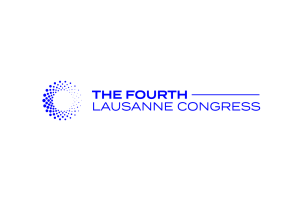Malone president participates in the historic fourth Lausanne Conference
In September 2024, the fourth Lausanne Conference (for World Evangelism) was held in South Korea: an international gathering of 5,000 leaders from church settings and secular workplaces who convened in the name of accelerating global missions together.

The Seoul-Incheon 2024 Congress (L4) was a multigenerational group of men and women who were selected to attend by world region, including 500 leaders from North America.
Among them was President Greg Miller.
“It was my distinct honor and pleasure to attend L4 with other Christian leaders from around the globe,” Miller said. “Not only do I feel called by the Lord to ensure that evangelism is part of my, our, ongoing work in Christian higher education and at Malone, but it’s also consistent with Malone University’s mission and legacy. Walter and Emma Malone made urban missions part of our curriculum on the day we were founded, and our seventh president, Everett Cattell not only served as a missionary in India for many years, but as past president of the World Evangelical Fellowship for five years, as well. We want our students to understand the importance of the Great Commission on a global level, and participating in these kinds of conversations are a vital part of that process.”
A working conference, which was the culmination of a broader strategic process since 2019, L4 facilitated collaboration within the global Church in order to shape world evangelism for 2050. The Congress is a unique opportunity for the global body of Christ to stand as one around a united call to “let the Church declare and display Christ together.” At the heart of the Lausanne Movement, conference participants worked together toward a four-fold vision to:
- Make the Gospel available for every person
- Support disciple-making churches for every people and place
- Empower Christ-like leaders for every church and sector
- Attain Kingdom impact in every sphere of society
The end result was the creation of a few documents that were an active response to achieving this vision, including:
- The State of the Great Commission Report – identifying where gaps and opportunities exist in modern-day global missions.
- The Seoul Statement – a theological and strategic statement that reflects how we should think about God and His world in the future based on today’s realities.
Nomination to participate in the in-person Congress is a multi-step selection process which is both rigorous and covered in prayer. It is a process which exists to ensure that the people gathered together appropriately reflect the rich diversity of the global church—across the regions of the world, across generations, and across spheres of influence. Criteria for eligibility includes:
- Active and vibrant spiritual life with a passionate commitment to God’s global mission
- Exemplary character, respected in their sphere of influence and recognized in their community
- A broad and expanding sphere of influence for Christ beyond their primary place of work or ministry
- A kingdom mindset of cooperative ministry and a readiness to engage in collaborative action
“The previous meetings of the Lausanne Congress gave us the terminology of the 10/40 Window and the idea of ‘unreached people groups’; I’m really looking forward to seeing how the Seoul Statement shapes the impact of global evangelism in the years to come,” said Miller. “In the times of sung worship, in particular, I could feel emotions very near the surface. I couldn’t help but see this gathering as a foretaste of the heavenly assembly that is promised in Revelation 7:9 --
After this I looked, and there before me was a great multitude that no one could count, from every nation, tribe, people and language, standing before the throne and before the Lamb. They were wearing white robes and were holding palm branches in their hands.
I was in awe as I watched 5,000 other faces from all around the world, hands raised, just praising the Lord. In those moments, I felt acutely our Christian call to declare and display Christ together.”
History of the Lausanne Movement:
Since 1974, the Lausanne Movement has connected influencers and ideas to form God-inspired connections across regions, generations, and shared interests. The Reverend Billy Graham convened the First Lausanne Congress in Lausanne, Switzerland, uniting the global church around the unfinished task of the Great Commission. Together with 2,400 mission-minded participants from 150 nations, a movement was born and The Lausanne Covenant was introduced; it still unites believers around the world on God’s mission today.
Widely regarded as one of the most significant documents in modern church history, the Lausanne Covenant defined what it means to be evangelical, and challenged Christians to work together to make Jesus Christ known throughout the world. In his groundbreaking address “Why Lausanne?” Graham highlighted the necessity of global evangelism, emphasizing unity among Christians to fulfil the Great Commission effectively and passionately.
Fifteen years later (1989), the second congress took place in Manila, Philippines. Missional focus shifted towards the 10/40 window, the region of the world most unreached by the Gospel. With increased intentionality towards social responsibility and strategic collaboration, over 800 new missional partnerships were formed.
In 2010, the third congress was held in Cape Town, South Africa. An assembly of 4,000 leaders from 198 countries made it one of the most diverse gatherings in Christian history. Initiatives for urban missions, holistic mission, reaching out to diaspora communities, and advancing the Gospel among oral learners can be traced back to this congress. There, The Cape Town Commitment emerged, which focused on societal issues like poverty, injustice, and environmental stewardship.
